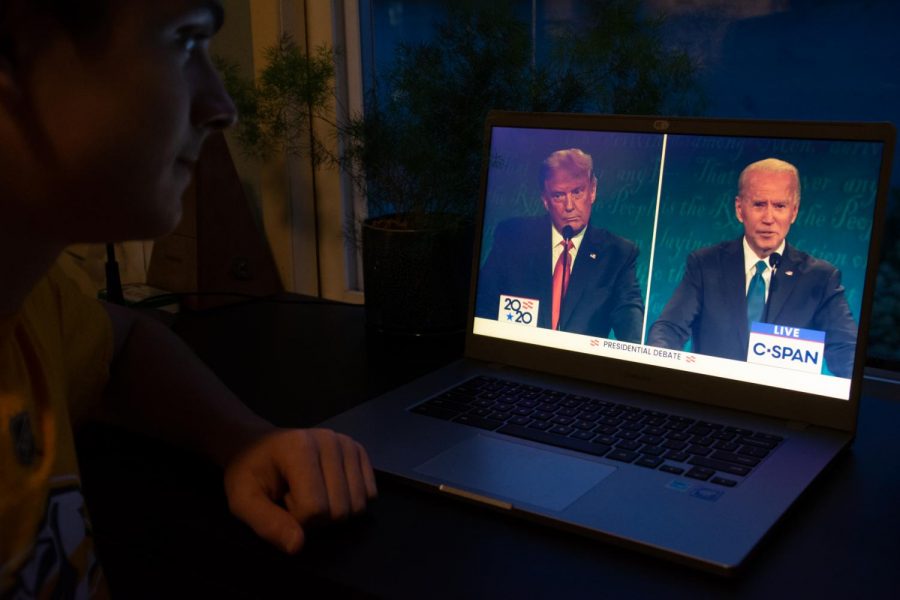This year’s presidential debates likely had little effect on election
More stories from Lincoln Wheeler
All year long, citizens of the United States of America had been anticipating the 2020 presidential debates and the election set to follow. As the year moved forward, increasing tensions between both parties built up the importance of these debates, yet there are substantial reasons to believe that they had little effect on the outcome of the election.
In 2016, the percentage of undecided voters going into the debates between candidates Hillary Clinton and Donald Trump was at an incredibly high 15 percent, according to Nate Silver of FiveThirtyEight, with many people doubting their party’s candidate.
Leading up to this year’s debates, however, that number shrank as the political divide in our country grew and sat around 4 percent, according to a poll from The Economist and YouGov that was run from Oct. 18 to Oct. 20.
Dr. Jack Miller, political scientist and Portland State University professor, explained that fewer undecided voters prior to this year’s debates likely means that there were fewer voters that could have been swayed by them. He also stated before the final debate that they don’t change much in the long run for other reasons.
“In a lot of cases, presidential debates don’t matter in terms of change in the complexion of the race,” Miller said. “And one of the reasons why they don’t matter is because they’re so potentially impactful that candidates prepare really well for them, so you would have to actually be poorly prepared and screw up royally [for any sort of change to occur].”
A poll hosted by Madison student journalists about the presidential debates was run from Oct. 23 to Oct. 31 and was open to all members of the Madison community. Thirty-three percent of the 75 respondents wrote that the debates certainly had no impact on their decision of who they supported.
Senior Senya Hammer Hamlin added that while the debates did reinforce her support for her candidate, she had already made up her mind on who she backed prior to the debates.
Derek Heath, government teacher and debate coach, strongly felt that there were major flaws with the execution of the first two debates, ones that could very well have prevented most of the influential and controversial answers the candidates may have given from being said. He thought the moderators did not do enough to hold the candidates accountable and get them to answer the hard questions.
“The moderator of a presidential debate should be biased against both candidates,” Heath said. “Their job is to attack, to frustrate, to trip. Their job is to make those candidates accountable and force them to answer incredibly difficult questions. It’s supposed to expose the hypocrisy, the lies, the distortions and half-truths, the poorly thought-out and formulated policies.”
On top of that, Heath claimed that the moderators of the first two debates “got nothing right.”
Heath’s belief that the moderators let the debates get too out of hand was supported by the responses from people like Madison community member Kerry Graves, who said that the disarray of the debates was too much to watch as it felt damaging to her mental well-being.
“The debates were not going to change my mind, so I did not watch,” Graves said when asked if the debates had helped her choose which candidate she supported. “The debates are bad for my blood pressure and mental health.”
While some might have found the moderators responsible for the interruptions and general unpopularity of the debates, Miller believes that a perfect debate between Trump and Joe Biden would be asking for too much. He believes that the reasons for the disarray were the candidates themselves, specifically their differing goals.
“I don’t know that there’s any ideal debate format that would produce the kind of exchange between two candidates that would give us a clear indication of what they stand for, how they differ, what their temperament is like,” Miller said. “In a way, for a debate to go well, there has to be a kind of culture among the two candidates and the moderator that is aimed at [a] common goal.”
He also believes that the vice presidential debate between Mike Pence and Kamala Harris was a better example of what happens when all three participants share expectations of what they have gathered to do, in their case, lay out the things their campaigns stand for.
Miller made sure to note that there are a few instances where the debates did matter. He cited the first ever presidential debate in 1960, when John F. Kennedy came off as more youthful and vibrant than the older Richard Nixon, ultimately aiding him in his victory, and the 1980 debate, when Ronald Reagan dispelled much of the lingering worries of his political skill.
Now that this year’s presidential debates and subsequent election are fading into history, only time will tell whether the debates four years from now will be any more powerful, or weaker, than this year’s.
Lincoln Wheeler (he/him) is a senior who loves playing hockey and guitar. He enjoys being a journalist because he wants to bring new perspectives and ideas to people.


